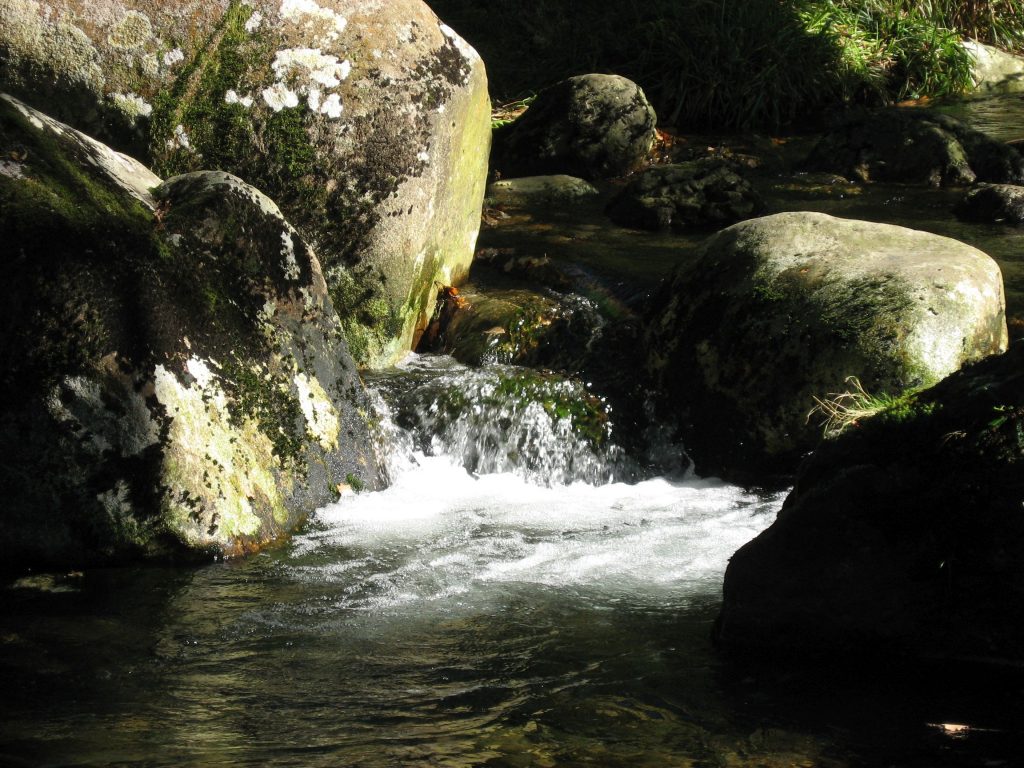
This was taken at New Grange, looking over the Boyne Valley, where Finn got his wisdom. The famous story, which you’ll find referred to on the poetry page is about cooking the salmon of wisdom and is all about how destiny will get the good stuff to the right person, but there is another story, referred to in Lady Gregory’s Gods and Fighting Men, and nowhere else, as far as I can see, about how Finn went to the Well of the Moon, which was guarded by the daughters of Beag, son of Boan (the goddess of the Boyne river) to get the sort of wisdom poets need. They wouldn’t give him any water, but when he tried to take some, one of them emptied a bottle of it over him —
The result (allegedly) is a pair of poems which are frequently anthologised, on the subject of summer and winter. I like Lady Gregory’s translation, because it includes the line: ‘the talking of rushes has begun’. The whole landscape seems alive, waterfalls calling out, seas asleep or awake, plants talking to each other, horses and people alert and active. These poems make the point that poetry is a matter of attention to all the beings of the world, listening trying to understand and communicate.
Which is a long way of getting to a bit of news that I sneaked out on Twitter last week. Thanks to the phenomenal organisation of Sheila Wakefield, battling through the havoc created by the pandemic, Red Squirrel Press have given the next collection a publication date – in May – and, after a lot of swithering, dithering and distraction, I have a final title: The Well of the Moon. This is also the title of a sequence of five poems, including Burnedthumb, which are the heart and pivot of the book. Because of the Burnedthumb motif, there are a few rather free translations or perhaps, responses to translations, in it, from Old English, Old Norse, and Latin. Honestly, I didn’t realise how much of this I had done, and why it was so important to my work.
The Latin one is a hymn to St Felix by a poet called Paulinus of Nola, whom I found in The Wandering Scholars, by Helen Waddell. He was a bishop of Nola (354-431) whom Waddell mentions as a pupil of the poet Ausonius (310-395), in connection with poems Ausonius wrote to him, lamenting the fact that Paulinus didn’t visit. This struck a chord with me, because no-one is visiting anyone just now, and as it turns out that it is the feast of St Felix today, I found myself writing this:
For Distant Friends
Written on 14th January 2021
It is the feast of Felix, and though the snow
makes roads a penance, I am working
on a springtime poem from a long dead man
in Italy. He serves a shrine to Felix, ransoms slaves,
sends loving poems to his teacher, missing him.
The teacher comments, ‘He answered many things,
but did not say that he would come’.
My friends, I can’t come either. More
than winter weather, bad roads, the fall of empires
keeps us apart, but like Paulinus, I send you
poems of love, of memory, of debts I owe you,
hope for better times, a promise to keep you
close to my heart, although I cannot come.




